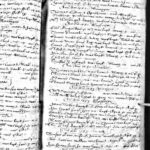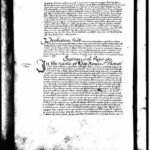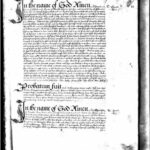
Date of Birth
1515
Place of Birth
Cambridgeshire, England
Towns / Cities Moved Into
Peterborough, Northamptonshire, England
Known Occupation
-
Religion
-
Spouse
Death Information
Year of death
March 12, 1602
Place of death
Peterborough, Northamptonshire, England
Cause of death
-
Burial location
St Peter's Church Lilford, East Northamptonshire Borough, Northamptonshire, England
Obituary

Parents

John Elmes

Edith Mordaunt
Marital Status


Married Alice St John
Siblings


Children




Narrative / Story
Edmund Elmes, born in 1515 in Cambridgeshire, England, embarked on a life journey that would see him become a notable figure in his community. His early years were spent in the serene landscapes of Cambridgeshire, where he was born into a family of some standing. His father, John Elmes, and mother, Edith Mordaunt, provided a stable and nurturing environment, fostering Edmund’s growth into a respected individual.
As Edmund grew, he moved to Peterborough, Northamptonshire, a significant move that marked a new chapter in his life. It was here that he would establish himself, both personally and professionally. His career, details of which remain somewhat obscure, would have been influenced by the socio-economic conditions of the time. Living through the 16th century, a period marked by profound social and economic changes in England, Edmund’s life and work were undoubtedly shaped by these transformations.
Edmund’s personal life was enriched by his marriage to Alice St John. Together, they had four children: Thomas, John, Margaret, and Elizabeth. This period of his life was likely filled with the joys and challenges of raising a family during a time when England was experiencing significant changes, including the establishment of the first English colony in America in 1585 and the founding of the Honourable East India Company in 1600.
The socio-economic landscape of Edmund’s time was complex. As a member of the gentry, he would have been somewhat insulated from the hardships faced by the lower classes but still subject to the broader political and economic shifts of the era. The establishment of colonies and the expansion of trade would have been topics of much interest and discussion in his circles.
Edmund’s life was also shaped by the local and national history of his time. The late 16th and early 17th centuries were periods of significant change in England, marked by religious upheaval, the expansion of overseas trade, and the beginnings of the British Empire. Edmund lived through the reigns of several monarchs, each bringing their own policies and challenges.
As Edmund aged, he would have witnessed and perhaps participated in the local governance and social affairs of Peterborough. His life, like many of his contemporaries, would have been governed by the rhythms of agricultural life, the demands of local and national politics, and the evolving social norms of the time.
Edmund Elmes passed away on March 12, 1602, in Peterborough. He was laid to rest in St Peter’s Church, Lilford, East Northamptonshire, leaving behind a legacy as a respected member of his community and a loving patriarch of his family. His life, spanning nearly a century, was a testament to the resilience and adaptability required to navigate the rapidly changing world of 16th-century England.


